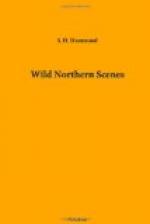a hard one. To live imprisoned between long rows
of brick walls, breathing an atmosphere charged with
the exhalations of ten thousand cooking stoves, the
dust of forges and the smoke of furnaces, machine shops,
gas works, filthy streets, and the thousand other manufactories
of villainous smells; where the summer air has no
freshness, no forest odors, or sweetness gathered
from fields of grain, the meadows, or the pastures.
To tramp only on stone sidewalks. To know nothing
of the pleasant paths beneath the spreading branches
of old primeval trees; no soft grass for their little
feet to press; never to wander along the streams or
the little brooks; to be strangers always to the beautiful
things spread out everywhere in the country in the
summer time. I always feel sad when I see the
pale faces of the little children of the great cities,
and marvel how so many of them grow up to be men and
women. It is a hard lot to be cooped up in the
city, vegitating, as it were, in the shade, where
there is no grass for their little feet to press,
no fences to climb, or fields to ramble over, or brooks
to wade, or running water on which to float chips,
and wherein to watch the little chubs and shiners
dancing and playing about, or fresh pure air to breathe,
or birds to listen to. It is a thousand pities
that the cities could not be emptied every summer of
their little people into the free and open country,
where they could run about, and sport and play, and
have free range and plenty of elbow-room. It
would make them so much healthier and happier, so much
more cheerful; their voices of gladness would ring
out so much more joyously in the morning, and their
songs be so much more sweet at night.”
I remember an anecdote told me of a little child,
born in the great metropolis, who had never, until
her fifth summer, been outside of the paved streets
of New York. Her mother had friends residing in
one of the up-river towns, owning a beautiful farm
overlooking the Hudson, and in early May she paid
them a visit, taking her little daughter with her.
Mary, of course, was delighted. Like a bird freed
from its cage, she flew about here, there, everywhere,
in-doors and out, among the chickens and the pigs,
the turkeys and the lambs, enjoying to the full the
thousand new things that her eyes rested upon all around
her, and her young spirits in wild commotion under
the bracing influences of the country air. “Mother!
mother!” she exclaimed, as she came dashing
into the parlor, her beautiful curls floating wildly
over her shoulders, and her bright eyes wide open
with wonder; “Mother I mother! come out here,
quick! and see this funny tree, all covered over with
snow-flakes, and how sweet it smells all around it.”
It was a plum tree in full blossom. That little
child had never seen the beautiful spring blossoms
on the fruit trees.




